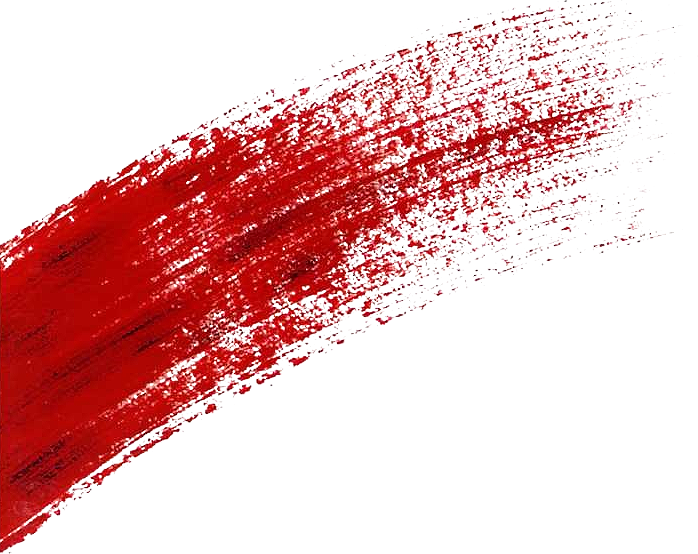Since its foundation in 1953 there have existed plans to found a „federal orchestra“ to promote tuition for top players or raise the standard of groups in general by offering general classes, private tuition and intensive practice. Aims were: execution of mandolin literature on a high level, representation at political and cultural events at home and abroad. Admission to the orchestra was submitted to being an excellent member of a local society or being resp having been the conductor of a local society. 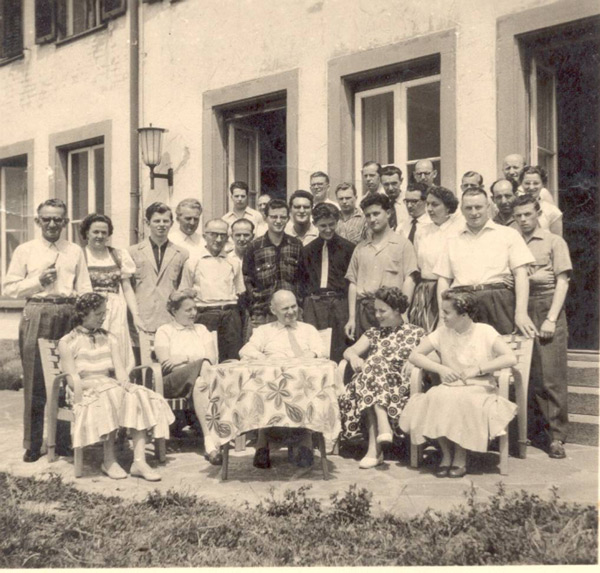 In August 1954 the first conductor’s class took place with the leading Berlin teacher of musical education Konrad Wölki. The final concert with 44 musicians terminated the federal orchestra BZVS was founded. The musicians practised regularly and constantly under the leadership of the head of federal music Hans Schmitt.
In August 1954 the first conductor’s class took place with the leading Berlin teacher of musical education Konrad Wölki. The final concert with 44 musicians terminated the federal orchestra BZVS was founded. The musicians practised regularly and constantly under the leadership of the head of federal music Hans Schmitt.
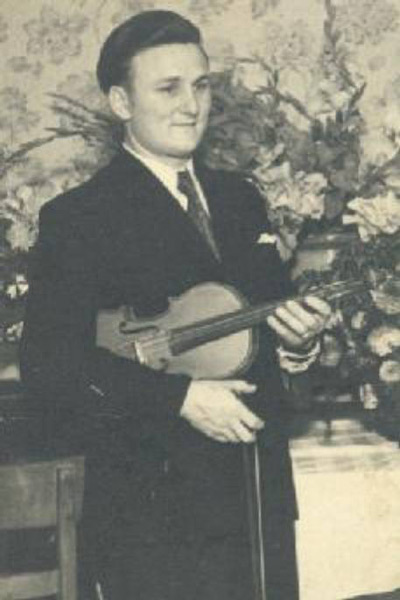 During the first years post-war problems made centralizing difficult due to restricted mobility and financial means of the members. This led to the foundation of six county orchestras that guaranteed continuity.
During the first years post-war problems made centralizing difficult due to restricted mobility and financial means of the members. This led to the foundation of six county orchestras that guaranteed continuity.
The annual classes in Rehlingen caused a remarkable rise in the standards of ensemble play and resulted in highly skilled participants whose performance on Saarländischer Rundfunk provoked great praise. The final concerts were regularly recorded by SR. Recordings under the leadership of Konrad and Gerda Wölki and chamber music performed by advanced participants using high level original literature as well as ’Evening Music’ by Kurt Schwaen created sensation.
The 20 year long cooperation with the composer and highschool teacher Heinrich Konietzny had great impact on the orchestra. Konietzny putting up exam regulation for conductors and composing special works for orchestra and soloists all recorded on SR.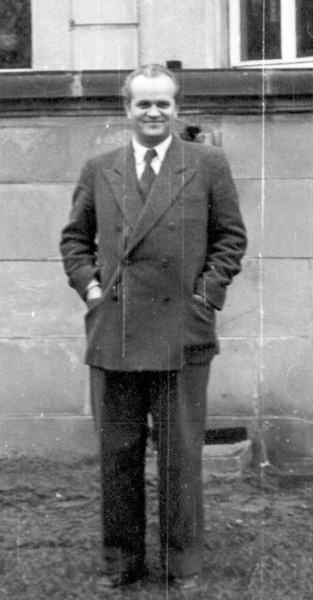
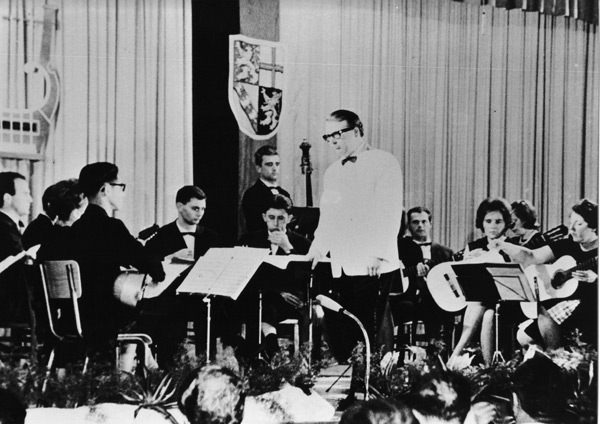 For the advanced classes Siegfried Behrend, famous guitarist, could be won for tuition in 1960. He became permanent conductor of the ’Saarländische Zupforchester’ SZO as it was christened after the SR recordings. The mandolin virtuoso Takashi Ochi came to lecture in the Saarland and became director of the SZO. This helped raise the musical level and the acceptance of mandolin music with the public remarkably. Leo Clambour, reporter of SR became managing director. The rising fame of the orchestra is documented by several tours to Italy, Belgium, Luxemburg as well as by a great number of radio recordings and TV casts. The SR being the motor of mandolin music at that time. Famous soloists like Peter Wetzler, tenor; Belina, song; Pierre Feit and Armin Aussem, oboe; Wilhelm Krumbach, cembalo; Norio Oshima, flute; Peter Hoch, accordion; Jiri Jirmal and Tadashi Sasaki, guitar; Siegfried Fink, percussion were long-time partners of the orchestra. Renowned composers wrote many works for the orchestra. Among them were more than 150 first performances under the leadership of Siegfried Behrend recorded and broadcasted. SR sound engineer Günter Braun and Helmut Fackler were both supporters and composers.
For the advanced classes Siegfried Behrend, famous guitarist, could be won for tuition in 1960. He became permanent conductor of the ’Saarländische Zupforchester’ SZO as it was christened after the SR recordings. The mandolin virtuoso Takashi Ochi came to lecture in the Saarland and became director of the SZO. This helped raise the musical level and the acceptance of mandolin music with the public remarkably. Leo Clambour, reporter of SR became managing director. The rising fame of the orchestra is documented by several tours to Italy, Belgium, Luxemburg as well as by a great number of radio recordings and TV casts. The SR being the motor of mandolin music at that time. Famous soloists like Peter Wetzler, tenor; Belina, song; Pierre Feit and Armin Aussem, oboe; Wilhelm Krumbach, cembalo; Norio Oshima, flute; Peter Hoch, accordion; Jiri Jirmal and Tadashi Sasaki, guitar; Siegfried Fink, percussion were long-time partners of the orchestra. Renowned composers wrote many works for the orchestra. Among them were more than 150 first performances under the leadership of Siegfried Behrend recorded and broadcasted. SR sound engineer Günter Braun and Helmut Fackler were both supporters and composers.
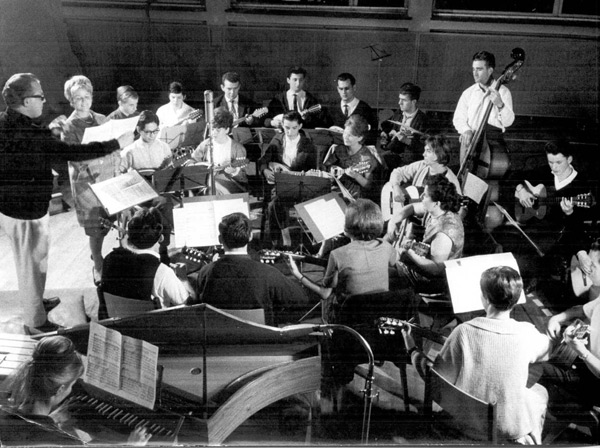 With the federal financial aid diminishing SR became the main sponsor, ordering special compositions and offering best broadcasting times. Broadcasting and the European tape exchange led to the expansion and general acceptance of mandolin music.
With the federal financial aid diminishing SR became the main sponsor, ordering special compositions and offering best broadcasting times. Broadcasting and the European tape exchange led to the expansion and general acceptance of mandolin music.
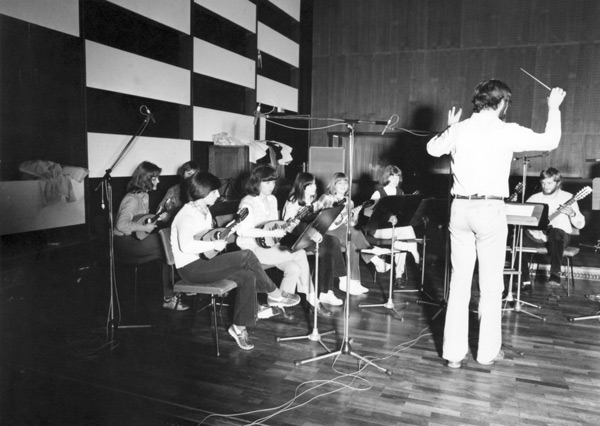 From 1974 to 1981 the Luxemburg born Marcel Wengler, student of H. Konietzny, was the conductor of SZO. More than 80 great compositions (symphonies, instrumental concerts, film music and works for mandolin) are well known. He was long-time assistant of Hans Werner Henze at Cologne Highschool for Music, is conductor of the ’Luxemburg Sinfonietta’ and Head of the Luxemburg ’Society of Contemporary Music’. He integrated the cembalo and replaced the counter basso by the cello thus giving the recordings an unmistakable tone. The highlight of his era was the performance of Heinrich Konietzny’s ’König von Harlem’ (King of Harlem) in the presence of the composer.
From 1974 to 1981 the Luxemburg born Marcel Wengler, student of H. Konietzny, was the conductor of SZO. More than 80 great compositions (symphonies, instrumental concerts, film music and works for mandolin) are well known. He was long-time assistant of Hans Werner Henze at Cologne Highschool for Music, is conductor of the ’Luxemburg Sinfonietta’ and Head of the Luxemburg ’Society of Contemporary Music’. He integrated the cembalo and replaced the counter basso by the cello thus giving the recordings an unmistakable tone. The highlight of his era was the performance of Heinrich Konietzny’s ’König von Harlem’ (King of Harlem) in the presence of the composer.
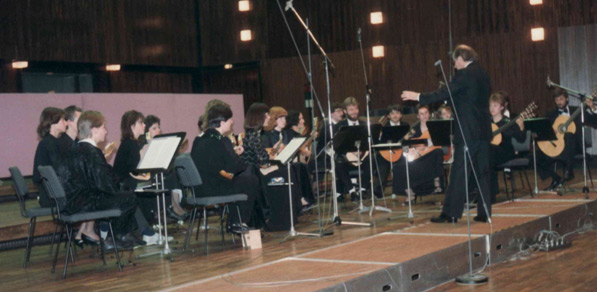 Helmut Fackler, former head of the music department at TV Saar, guided the SZO from 1981 to 1988. Since 1997 he teaches acoustics and media science at Saarbrücken Highschool for Music. He is a freelance journalist and music critic as well as head of the music board of the country. He also composed music for radio plays, choir and chamber orchestra and several works for plucked string instruments.
Helmut Fackler, former head of the music department at TV Saar, guided the SZO from 1981 to 1988. Since 1997 he teaches acoustics and media science at Saarbrücken Highschool for Music. He is a freelance journalist and music critic as well as head of the music board of the country. He also composed music for radio plays, choir and chamber orchestra and several works for plucked string instruments.
Besides Renaissance and Baroque he laid great emphasis on contemporary music, partly composed by himself. Being an acoustics expert he changed the placement – placing the mandolins in front of the conductor instead of sideways in order to direct the sound straight to the audience.
 Since 1988 the Saarland born Reiner Stutz has been the conductor of SZO. He studied guitar with Koch, Kämmerling and Käppel and composition with Professor Reiter. He has got a lectureship for guitar at Koblenz and Cologne university and teaches master classes at home and abroad. He also is a distinguished composer and editor, well known for his arrangements.
Since 1988 the Saarland born Reiner Stutz has been the conductor of SZO. He studied guitar with Koch, Kämmerling and Käppel and composition with Professor Reiter. He has got a lectureship for guitar at Koblenz and Cologne university and teaches master classes at home and abroad. He also is a distinguished composer and editor, well known for his arrangements.
He introduced the “Wuppertal Technique”,i.e. the technique of the 18th century masters of the mandolin, rediscovered by Professor Wilden-Hüsgen and taught in her Wuppertal mandolin classes. This improved the tone quality of the orchestra distinctly and lead to a more differentiated expressivity.
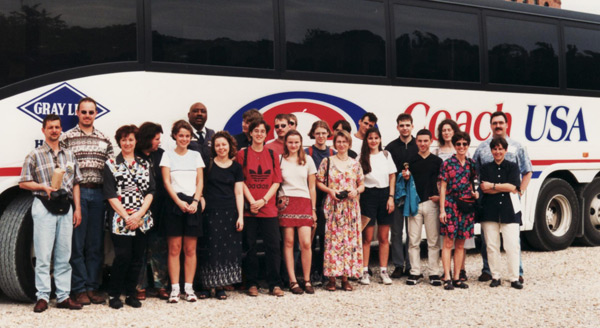 Several orchestra tours, the highlight being the tour to Japan in 2002, and international musical festivals in the Saarland, took place under his leadership.
Several orchestra tours, the highlight being the tour to Japan in 2002, and international musical festivals in the Saarland, took place under his leadership.
He is supported by Nicole Forse, contact person for organisation and management, and Monika Reiter, concert-master, who, during long years of activity, has considerably shaped the orchestra. Thomas Kronenberger, the president, member for many decades, is responsible for financing, organization, publicity and logistics. The “friends of the orchestra” (Förderverein) give the orchestra financial and creative support.
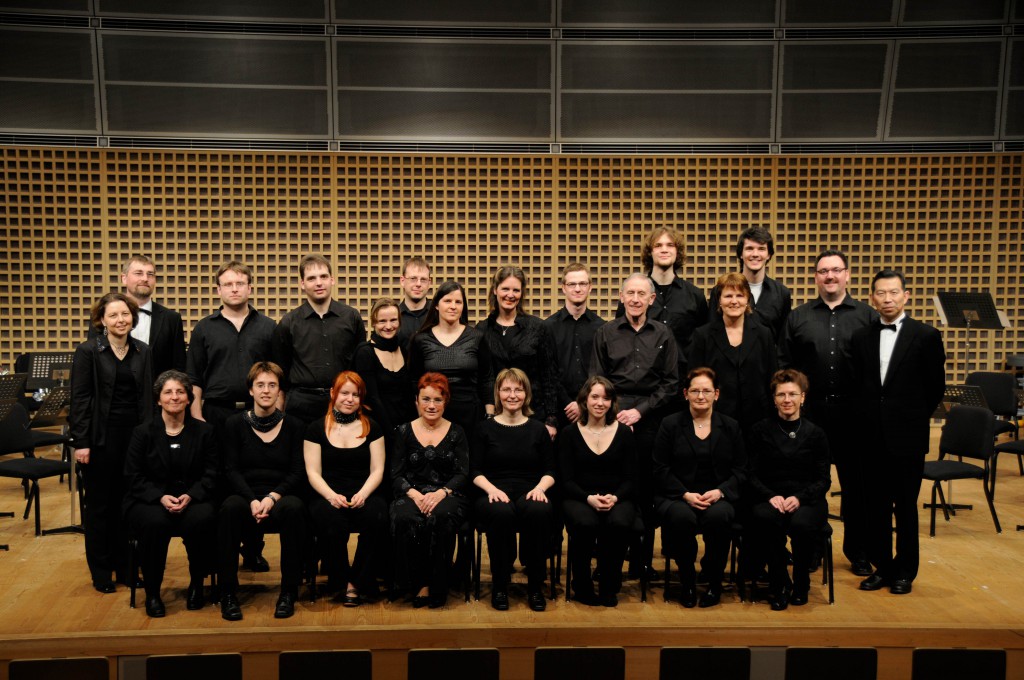 The present profile of the orchestra as displayed at the splendid festival concert for its 60th anniversary, the participation at the Eurofestival of plucked string music in Bamberg (2006) and in Bruchsal (2010, 2014) together with the growing number of qualified young performers witness that the SZO is on its way to continue the successful history of the last 60 years.
The present profile of the orchestra as displayed at the splendid festival concert for its 60th anniversary, the participation at the Eurofestival of plucked string music in Bamberg (2006) and in Bruchsal (2010, 2014) together with the growing number of qualified young performers witness that the SZO is on its way to continue the successful history of the last 60 years.
